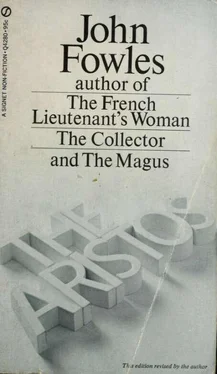John Fowles - The Aristos
Здесь есть возможность читать онлайн «John Fowles - The Aristos» весь текст электронной книги совершенно бесплатно (целиком полную версию без сокращений). В некоторых случаях можно слушать аудио, скачать через торрент в формате fb2 и присутствует краткое содержание. Год выпуска: 1970, Издательство: New York, N.Y. : New American Library, Жанр: Философия, на английском языке. Описание произведения, (предисловие) а так же отзывы посетителей доступны на портале библиотеки ЛибКат.
- Название:The Aristos
- Автор:
- Издательство:New York, N.Y. : New American Library
- Жанр:
- Год:1970
- ISBN:нет данных
- Рейтинг книги:3 / 5. Голосов: 1
-
Избранное:Добавить в избранное
- Отзывы:
-
Ваша оценка:
- 60
- 1
- 2
- 3
- 4
- 5
The Aristos: краткое содержание, описание и аннотация
Предлагаем к чтению аннотацию, описание, краткое содержание или предисловие (зависит от того, что написал сам автор книги «The Aristos»). Если вы не нашли необходимую информацию о книге — напишите в комментариях, мы постараемся отыскать её.
The Aristos — читать онлайн бесплатно полную книгу (весь текст) целиком
Ниже представлен текст книги, разбитый по страницам. Система сохранения места последней прочитанной страницы, позволяет с удобством читать онлайн бесплатно книгу «The Aristos», без необходимости каждый раз заново искать на чём Вы остановились. Поставьте закладку, и сможете в любой момент перейти на страницу, на которой закончили чтение.
Интервал:
Закладка:
36 There are more kinds of hypocrisy than the conscious ones. All opposition points to the opposed. Look how attractive Christianity has made sin. The best opposition is always scientific, logical, rational. The more unanswerable in reason it is, the better it is.
37 The psychiatric patient is not cured, but made less abnormal, by understanding the contradictions of his own nature. Dimly he begins to see how the forces that use him can be used. To understand is not only to forgive; it is to control.
38 Before opposing, ask these questions:
To what extent do I enjoy opposing? If I could annihilate in one blow all that I oppose, would I make that blow?
Will my opposition weaken or strengthen the thing opposed?
How effective is my proposed form of opposition likely to be?
Is it a pose or a reality?
To what extent is it caused purely by a desire to be admired, or not despised, by those I admire?
Is there anything else I could oppose more usefully?
39 My opposition is ‘my duty’; if I once admitted that my opposition was really my pleasure…
40 Tears wept on enemy graves are often peculiarly sincere; we weep our own now homeless energy.
41 So many movements of opposition are Charges of the Light Brigade. And, symptomatically, we admire their failure more than we hate their waste and futility.
GOOD EQUALS EVIL
42 There is one last desperate argument sometimes advanced against doing good actions. It is this: all actions, whether intended to be good or bad, interweave so extensively as time passes that finally their relative goodness or badness completely disappears. Both evil and good die; or are metamorphosed.
43 We all know evils to some can cause good to others; but to leap from what may be true of the whole, or true of any given action viewed historically, to the theory that the individual can be excused any moral concern about his actions is to fall into the fallacy that what is true of an action must be true of the enactor. A man must finally do good for his own and his society’s health; not for good’s sake or the action s sake.
44 If good finally becomes lost in evil, and evil in good, then it is to ensure the survival of matter; not of humanity.
45 All our judgements of right and wrong are absolutely and evolutionally meaningless. But we are like a judge who is compelled to judge. Our function is to judge, to choose between good and evil. If we refuse to do so, we cease to be human beings and revert to our basic state, of being matter; and even at his very worst the very worst among us is still something more than a few score kilograms of complaisant molecules.
WHY SO LITTLE GOOD?
46 Yet even given these reasons, given that failure to enact good must often arise from the difficulty of knowing which of several possible courses is the best or from a genuine inability to see any necessity for action (the ancient heresy of quietism), we are all aware that we do not do all the good we could. However stupid we are, there are simple situations in which we can see a clearly good course of action, and yet shirk it; however selfish we are, there are good courses that involve no self-sacrifice, and yet we shirk them.
47 For the last two and a half millennia almost every great thinker, every great saint, every great artist has advocated, personified and celebrated – or at least implied – the nobility and excellence of the good act as the basis of the just society. On their evidence its social and biological value cannot be in doubt. So it almost seems as if the great humans are wrong, as if in the commoner bulk of mankind there was some apprehension of a perverse but deeper truth: it is better generally to do nothing than generally to do good.
48 I believe this strange and irrational apathy is largely due to the religion-engendered myths that doing good will bring us pleasure – if there is an after-life, eternal pleasure – and that thus the good man is happier than the bad. The world around us is full of evidence that these are indeed myths: good men are very often far less happy than bad ones, and good actions very often bring nothing but pain. Just as he is an eternal seeker of the agent, man is an eternal seeker of the reward. He feels there ought to be some further recompense – something more than a clear conscience and a feeling of self-righteousness – for doing good. The conclusion is irresistible: doing good must bring (and therefore before the doing, promise) pleasure. If it does not, then it is a bad bargain.
49 There are two obvious ‘modes’ of pleasure. One we may call intended in that the event which brings pleasure, the meeting with a lover, the visit to a concert, is planned and intended. The second and much more important kind is fortuitous, in that it comes unexpectedly – not only the surprise meeting with an old friend, the sudden beauty of some usually banal landscape, but all those elements in the active intention to have pleasure that were not clearly foreseen. In fact, when we plan an intended pleasure we always unconsciously assume that there will be a free bonus of the fortuitous kind. Our approach is that of the traveller: to the extent that his journey is planned and has definite aims he will get the pleasure intended, but he will also expect a very large content of the fortuitous kind, both in what he intended to happen to him and in what will happen to him by chance. In this way we hedge our bets – if the planned pleasures disappoint, there are the unexpected ones, and vice versa.
50 What is immediately striking about both these modes of pleasure is that they depend very largely on hazard.
A girl may have long planned to marry. But when the wedding is finally present, is taking place, there is a sense of good luck. Nothing has happened, although many things could have happened, to prevent it. Perhaps she may look back then to the chance first encounter with the man who is now her husband; and the basic element of hazard there is overwhelming. In short, we are conditioned to see pleasure of both kinds as very largely a result of hazard. We do not arrive at it so much as it arrives at us .
51 But as soon as we treat pleasure as a kind of successful bet, and then expect this sort of pleasure from moral choices and actions, we are in trouble. The atmosphere of chance that pervades the one world will contaminate the other. Hazard rules the laws of pleasure – so let it, we say, rule the laws of doing good. Worse than that we shall come to the obvious conclusion that only good actions that promise pleasure are worth our doing. The pleasure may come from community esteem, from personal gratitude, from self-interest (the hope of good in return); from hopes of a pleasant afterlife; from being freed of the sense of guilt, if such a sense has been ‘built in’ by the cultural environment. But in each case the incentive, however necessary historically or justifiable on pragmatic grounds, creates a totally wrong climate around our intention to act well.
52 Doing good for some public reward is not doing good: it is doing something for public reward . That it also does good may seem to be its justification; but it is a dangerous justification, as I shall show.
53 There is a third less obvious ‘mode’ of pleasure to which we do not usually attach the idea, though we have the sensation, of pleasure. We may call it functional, and it is the pleasure we get from all those activities essential to our being – eating, excreting, breathing, and ultimately, existing. In a sense these are the only pleasures we cannot deny having. If we do not distinguish them very clearly it is because they are overlaid by the other two much more conscious and complex modes. If I choose what I eat, I experience the intended pleasure; if I enjoy what I eat more than I expected, I experience the fortuitous; but buried beneath is the functional pleasure of eating because to eat is to continue to exist. To use Jungian terminology, this third mode is archetypal, and I believe that from it we ought to derive our motive for doing good. In terms of bodily functions, we should evacuate good – not ejaculate it.
Читать дальшеИнтервал:
Закладка:
Похожие книги на «The Aristos»
Представляем Вашему вниманию похожие книги на «The Aristos» списком для выбора. Мы отобрали схожую по названию и смыслу литературу в надежде предоставить читателям больше вариантов отыскать новые, интересные, ещё непрочитанные произведения.
Обсуждение, отзывы о книге «The Aristos» и просто собственные мнения читателей. Оставьте ваши комментарии, напишите, что Вы думаете о произведении, его смысле или главных героях. Укажите что конкретно понравилось, а что нет, и почему Вы так считаете.












